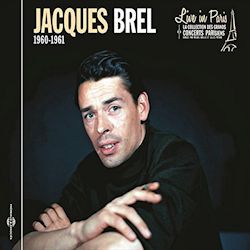 BUY NOW AmazonUK AmazonUS |
Live in Paris
|
Rosa
Le plat pays
Bruxelles
Les paumés du petit matin
La statue
Les bourgeois
Marieke
Madeleine
Les biches
Zangra
Le caporal Casse-Pompon
L'ivrogne
La valse à mille temps
Ne me quitte pas
Le moribond
Quand on n'a que l'amour
Seul
La dame patronnesse
Les singes
Ne me quitte pas – version 2
L'air de la bêtise
La colombe
Quand on a que l'amour – version 2
Jacques Brel with accompanists
Recorded live at Olympia Theatre, Paris October 1961 (tracks 1-17) and Foire de Douai, France, September 1960 (tracks 18-24)
This is part of a strong-looking stable of releases that features such elite exponents of French chanson as Barbara, Brassens, Henri Salvador, Léo Ferré, Georges Moustaki and Yves Montand – to say nothing of Piaf. In other words, it’s pretty much top of the range artists in performances that run from roughly 1948 to 1962. Brel’s disc centres on two live concerts, the first from the Olympia in 1961 (17 tracks out of 24), a previously unreleased performance, and the second from Foire de Douai in 1960.
It’s full of Brel’s charisma, vehement romanticism, poetry and his occasional lachrymosity. The avid accelerandi in Les prénoms de Paris are superbly judged and show Brel, in the pivotal years 1960-61, to have matured into a true poet-musician, a Franco-Belgian tower of song. The performance of Le plat pays is about as sensitive as one can imagine, though there are residual signs that Charles Trenet still held a spell over Brel in the avuncular up-tempo Bruxelles. The avuncular brio here sounds slightly – though attractively – retrogressive in the context of the more up-to-the-mark material.
The narrative theatricality he could summon up, as in Zangra, is intense in this Olympia concert, his way with parlando supreme on its own terms. Then there’s the verve he brings to L'ivrogne ensuring that the programme enjoys a natural rise and fall, a diminishing and intensification of feeling. Quite how he manages the tongue-twisting demands of the virtuosic La valse à mille temps I don’t think I’ll ever quite now – constant practice one assumes – with principally accompaniment here from accordion and drums. Naturally it’s followed by Ne me quitte pas with its deft orchestral underfelt, as affecting as ever.
The items from the Foire de Douai concert the previous year feature a much smaller instrumental backing – piano, bass, and probably – hard to hear – drums. He sings two items that appeared at the Olympia - Quand on a que l'amour, a masterclass in how to build a song from a bare wisp of voice to full declamatory passion, and Ne me quitte pas which may be a touch less intense than the Olympia performance but no less wrenching for all that.
Patrick Frémeaux’s notes are in French and English and sport a fine essay on Brel live in Paris. The sound is hardly hi-fi: it’s good for the locations and circumstances. I invariably find Brel enthralling and this is no exception to the rule.
Jonathan Woolf